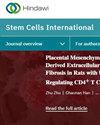Mesenchymal Stem Cells and Extracellular Vesicles: Therapeutic Potential in Organ Transplantation
IF 3.3
3区 医学
Q2 CELL & TISSUE ENGINEERING
引用次数: 0
Abstract
At present, organ transplantation remains the most appropriate therapy for patients with end-stage organ failure. However, the field of organ transplantation is still facing many challenges, including the shortage of organ donors, graft function damage caused by organ metastasis, and antibody-mediated immune rejection. It is therefore urgently necessary to find new and effective treatment. Stem cell therapy has been regarded as a “regenerative medicine technology.” Mesenchymal stem cells (MSCs), as the most common source of cells for stem cell therapy, play an important role in regulating innate and adaptive immune responses and have been widely used in clinical trials for the treatment of autoimmune and inflammatory diseases. Increasing evidence has shown that MSCs mainly rely on paracrine pathways to exert immunomodulatory functions. In addition, mesenchymal stem cell-derived extracellular vesicles (MSC-EVs) are the main components of paracrine substances of MSCs. Herein, an overview of the application of the function of MSCs and MSC-EVs in organ transplantation will focus on the progress reported in recent experimental and clinical findings and explore their uses for graft preconditioning and recipient immune tolerance regulation. Additionally, the limitations on the use of MSC and MSC-EVs are also discussed, covering the isolation of exosomes and preservation techniques. Finally, the opportunities and challenges for translating MSCs and MSC-EVs into clinical practice of organ transplantation are also evaluated.间充质干细胞和细胞外囊泡:器官移植的治疗潜力
目前,器官移植仍是治疗终末期器官衰竭患者的最合适疗法。然而,器官移植领域仍面临诸多挑战,包括器官供体短缺、器官转移导致的移植功能损伤、抗体介导的免疫排斥反应等。因此,寻找新的有效治疗方法迫在眉睫。干细胞疗法被誉为 "再生医学技术"。间充质干细胞(MSCs)作为干细胞疗法最常见的细胞来源,在调节先天性免疫反应和适应性免疫反应方面发挥着重要作用,已被广泛应用于治疗自身免疫性疾病和炎症性疾病的临床试验中。越来越多的证据表明,间充质干细胞主要依靠旁分泌途径发挥免疫调节功能。此外,间充质干细胞衍生的细胞外囊泡(MSC-EVs)是间充质干细胞旁分泌物质的主要成分。本文将综述间充质干细胞和间充质干细胞-细胞外小泡在器官移植中的功能应用,重点介绍近期实验和临床发现的进展,并探讨它们在移植物预处理和受体免疫耐受调节中的应用。此外,还将讨论使用间充质干细胞和间充质干细胞-EV 的局限性,包括外泌体的分离和保存技术。最后,还评估了将间充质干细胞和间充质干细胞-EV 转化为器官移植临床实践的机遇和挑战。
本文章由计算机程序翻译,如有差异,请以英文原文为准。
求助全文
约1分钟内获得全文
求助全文
来源期刊

Stem Cells International
CELL & TISSUE ENGINEERING-
CiteScore
8.10
自引率
2.30%
发文量
188
审稿时长
18 weeks
期刊介绍:
Stem Cells International is a peer-reviewed, Open Access journal that publishes original research articles, review articles, and clinical studies in all areas of stem cell biology and applications. The journal will consider basic, translational, and clinical research, including animal models and clinical trials.
Topics covered include, but are not limited to: embryonic stem cells; induced pluripotent stem cells; tissue-specific stem cells; stem cell differentiation; genetics and epigenetics; cancer stem cells; stem cell technologies; ethical, legal, and social issues.
 求助内容:
求助内容: 应助结果提醒方式:
应助结果提醒方式:


